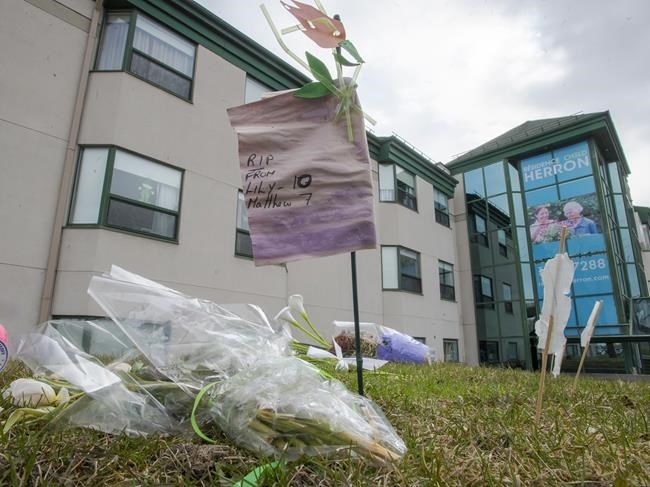
Flowers and notes for loved ones are seen at a makeshift memorial in front of the CHSLD Herron seniors residence Wednesday April 22, 2020 in Dorval, Quebec. THE CANADIAN PRESS/Ryan Remiorz
Republished September 22, 2021 - 7:07 AM
Original Publication Date September 21, 2021 - 10:36 AM
MONTREAL - The director of a Montreal long-term care home where 47 people died during the first wave of the COVID-19 pandemic says everything was normal just a few days before health officials were urgently called in to help, a coroner's inquiry heard Tuesday.
Andrei Stanica, the former manager of Résidence Herron, took the stand at an inquest looking into long-term care deaths.
While health authority managers said they found residents unfed, dehydrated, soiled and the facility in a terrible state when they came to help on March 29, 2020, Stanica said everything appeared fine two days earlier.
Stanica said the dining room had been shuttered and weekly cleanings of units had been put on hold to reduce contacts in the previous week but assured there were no issues with residents being hydrated.
"Everything was normal," Stanica said, causing Coroner Géhane Kamel to interject.
"On March 29, when the (health authority) team arrives, people are in a lamentable state," Kamel said. "That's impossible in a span of two days."
The coroner's mandate is to investigate 53 deaths at six long-term care homes and one seniors' residence — including 47 at Herron — during the first wave of the pandemic.
Stanica said there were staffing problems before the pandemic and the facility, which he said charged between $3,150 and $5,650 per month for a unit — had lost its director of care, who had quit.
Also, nearly 20 care and kitchen staff left in January 2020 to take jobs in the public system where they were paid $20 an hour to start, about five to six dollars more than the private residence.
The manager said he was desperate and forced to use agencies to find replacement staff, many of whom didn't speak English — an issue for the mostly English-speaking residents. The inquiry has heard from health officials that some of the agency staff sent to work at Herron were woefully unqualified. Stanica told the inquiry some agency staff threw out towels instead of sending them to be washed.
The inquiry has also heard that equipment was difficult to come by at the care home. Stanica said he made several orders for equipment as he prepared for the pandemic but was told by suppliers there was no stock.
Still, Stanica said the residence took steps to prepare, sending out messages to employees and hygiene directives as early as February 2020, before the province declared a public health emergency in mid-March.
"I saw what was happening in Europe so I was aware it was impossible a pandemic like this was going to travel around the province without impacting us," he said.
Stanica would fall ill on March 27, the same day the first positive case was declared at Herron. He would test positive for COVID-19 and recover, returning to the facility but not as manager, as health officials had taken over.
Earlier Tuesday, Kamel once again questioned why more wasn't done to help Herron residents.
Kamel has repeatedly asked why it took regional health authorities days to get more employees and front-line staff to Herron, calling it a "black hole" in her investigation.
Even though health network managers had seen by March 29, 2020, that residents weren't getting enough to eat or drink at the understaffed private facility, the inquest heard of a chaotic situation that persisted at the care home well into early April 2020 and a power struggle over who was in charge.
Alexandre Mercier, a human resources employee with the health authority for western Montreal, testified that lives might have been saved if they had dispatched more staff to the hard-hit home.
While managers had shown up to help at the residence in late March, the request to send staff to the facility only reached Mercier on April 5. He visited the site two days later and found it disorganized and understaffed with some rooms smelling of urine.
A day later, one of his colleagues confided she wasn't confident the residents would survive the month. Mercier said there appeared to be confusion about the role the health authority was supposed to be playing in what was not a typical trusteeship.
The coroner asked Mercier why residents weren't transferred to other facilities. He said the entire system was overwhelmed by staff shortages and there were fears of overloaded emergency and intensive care units and of COVID-19 spread.
"So we sacrificed them," Kamel replied.
Premier François Legault was asked Tuesday about the hearings and said what happened at Herron was terrible. But he said improvements have been made since the pandemic hit, and he pointed a finger at health reforms introduced by the previous Liberal government, which was defeated in 2018.
"I think that today the situation is very different, I think that we’re almost a model, there’s almost nobody having COVID-19 in our (long-term care homes), so it’s a major change," Legault said in Quebec City.
"What happened at Herron was unacceptable and terrible, and I hope that I will never see that again in my life.”
This report by The Canadian Press was first published Sept. 21, 2021.
News from © The Canadian Press, 2021